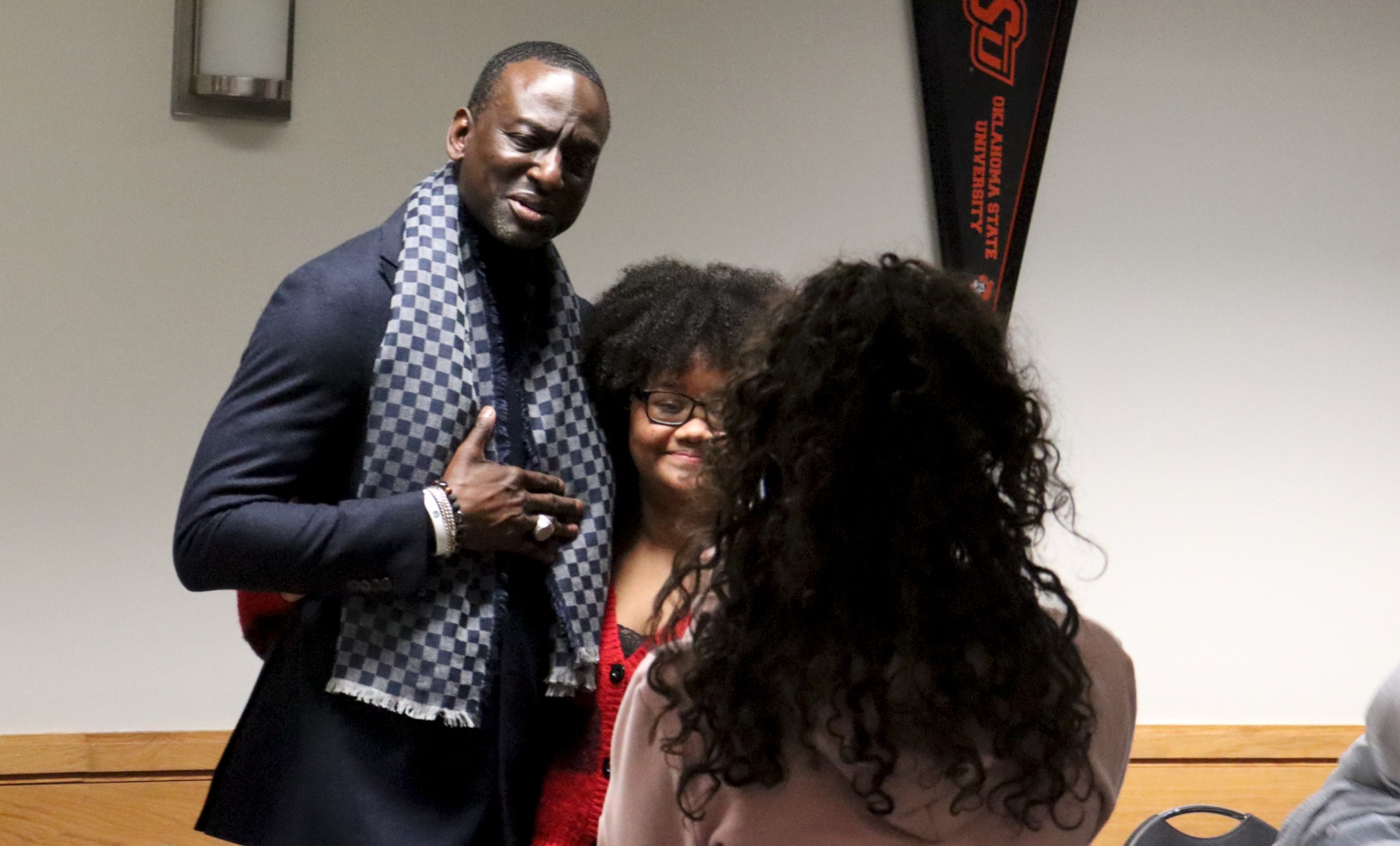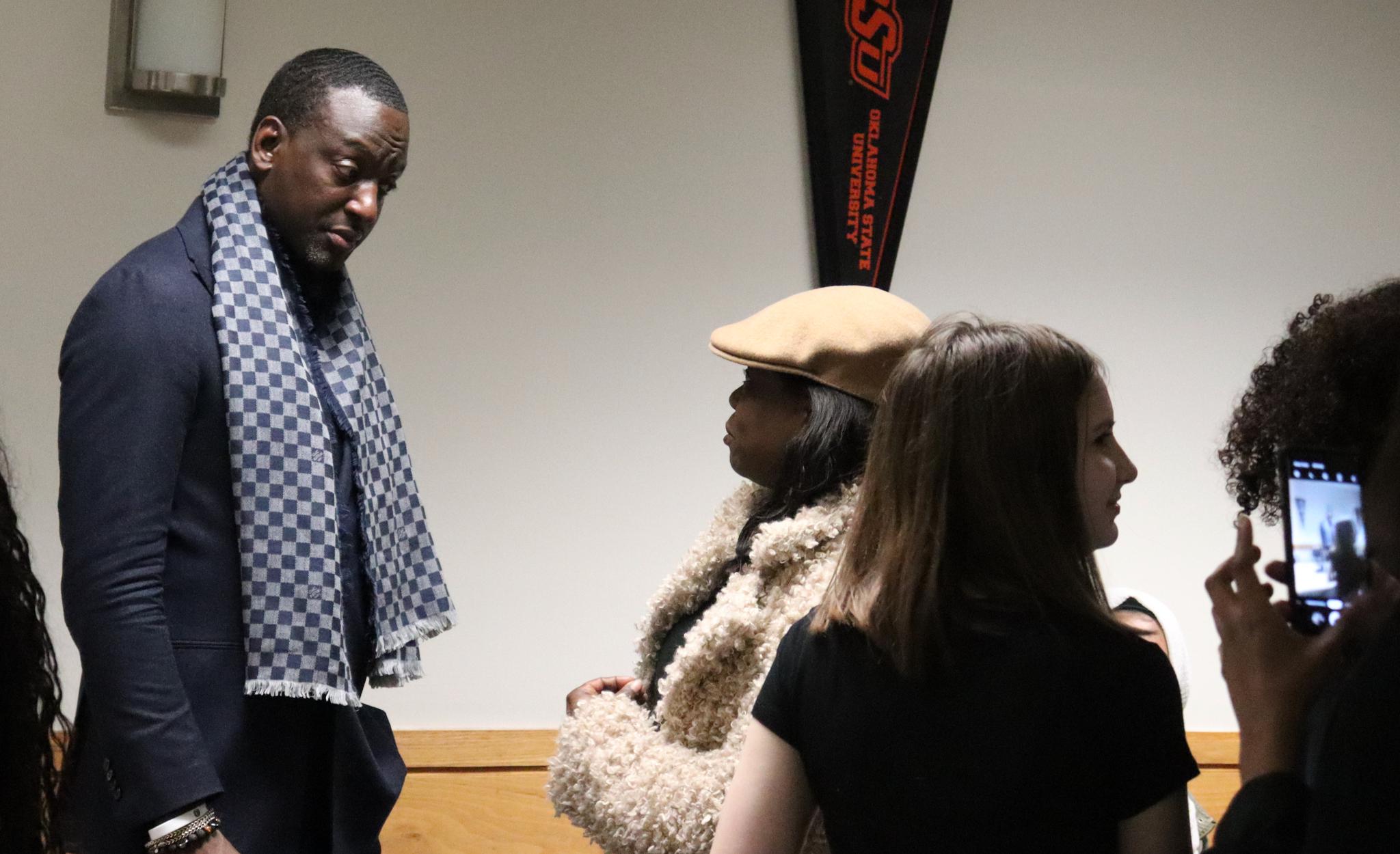Yusef Salaam, of the exonerated ‘Central Park 5,’ speaks of hope for reform

Despite the injustice brought upon him and his family by crooked law enforcement, prosecutors and media three decades ago, Yusef Salaam delivered a hopeful and empowering message to a packed auditorium Saturday night at the Kansas Union.
Salaam, one of the “Exonerated Five” formerly dubbed the “Central Park Five,” had his young life upended when he and four friends, all boys of color between ages 14 and 16 at the time, were accused and wrongly convicted of a brutal April 19, 1989, attack and rape of a white jogger in New York City.
None of the boys was involved in the attack. The victim had lost 75% of her blood, yet not one of the boys had any blood on his clothing. Police, through violence and deception, had coerced all but one of the boys — Salaam — to provide videotaped confessions. Salaam said Saturday that his mother had burst into the interrogation room like a “supershero” and told him to stop talking to them.
DNA evidence eventually linked a sixth man to the crime, and though he had committed a similar rape in Central Park just days prior, investigators did not link the two.
Salaam, Kevin Richardson, Antron McCray, Raymond Santana and Korey Wise were exonerated in 2002, after convicted murderer and rapist Matias Reyes finally confessed that he had been solely responsible for the attack.
The boys had been out that night — ”wilding,” they’d told police. But the term was quickly misappropriated as prosecutors, law enforcement and media spun it to mean going out to commit violent acts.
"'Wilding' was about dancing and having a good time, and fun,” Salaam said, “but they took this term and made it into something else so that when people looked at people of color, they automatically became suspicious. They automatically thought the worst of them.”
Within a couple of weeks of being accused — not convicted — Salaam and his family members were receiving death threats, including a full-page ad placed in multiple newspapers by now-President Donald Trump that called for bringing back the death penalty.
He read from one of the letters to the crowd Saturday: “There is no excuse for what you did to that woman. You deserve at least to die. When you get to prison, I hope you're tortured like no other human being has been tortured. You are a waste and cannot possibly be one of God's children.”
“This is a country where we're supposed to be innocent until proven guilty,” Salaam said. “Well, if you happen to have a skin color like mine, they see you as guilty and having to prove yourself innocent.”
Still, Salaam said he held out hope until they lost trial. When the verdict came back, he’d said the truth would finally come out; then the foreman of the jury read the word “guilty” so many times he lost count.
He recited a poem or rap he’d spoken at his sentencing hearing, which repeats the refrain “I stand accused.” In it, he addresses the system, racial disparities and the media’s haste to report the words he said police had distorted.
“I began to grow and rise right before them, and then it was apparent what hate they had in their eyes for me,” Salaam said. “They were looking at this future self of me that they were trying to kill.”
Salaam managed to find peace throughout his time in prison, though he acknowledged that not everyone can do so. He spoke about how some of the guards had told him that they knew he was innocent, and how he had meditated as he’d walked the corridors.
“If I was in jail and I got a college degree, we can do anything,” Salaam said.
One of the hundreds of people in the audience asked Salaam during a Q&A session about Trump’s ad, for which the president has refused to apologize. Salaam said holding onto anger and resentment is like a ball and chain. He said he can think about it, or he can move on.
“For me, it’s about moving on,” Salaam said. “... If you allow anybody to control any moment of your life, they’ve won; you haven’t.”

The case was the subject of the 2012 Ken Burns documentary “The Central Park Five,” and more recently, the Netflix miniseries “When They See Us.” Salaam said the latter had been viewed by more than 23 million households in 190 countries within a few weeks of its release in May 2019.
Salaam said that he thinks the case would have gone differently if it had happened today, in the age of social media. He said he’s heard people say things to the effect of “let’s not end up with another Central Park jogger case” — people on juries want to get it right. They want their civic duty to get to the truth.
And he touted the Innocence Project’s successes — he said the nonprofit has helped more than 300 convictions of the wrong people be overturned.
“Some people have been found innocent after doing 40-plus years,” said Salaam, who spent nearly seven years behind bars. “That’s a lifetime of tragedy.”
Salaam said the criminal justice system isn’t broken — this is the way it was designed and built.
“So how do we dismantle the parts that don’t suit us, and keep the rest? Is it about reform, or is it about just demolishing the whole system?” he asked. “I think it’s about both. We’ve got to have people in both spaces working together to move the wheel forward.”
— Published in the Lawrence Journal-World Feb. 9, 2020
